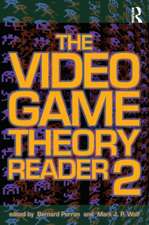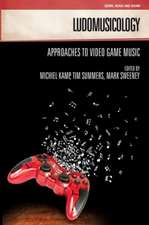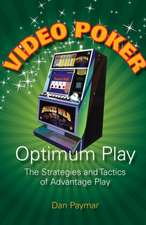The Video Game Theory Reader
Editat de Mark J.P. Wolf, Bernard Perronen Limba Engleză Hardback – 19 aug 2003
The Video Game Theory Reader brings together exciting new work on the many ways video games are reshaping the face of entertainment and our relationship with technology. Drawing upon examples from widely popular games ranging from Space Invaders to Final Fantasy IX and Combat Flight Simulator 2, the contributors discuss the relationship between video games and other media; the shift from third- to first-person games; gamers and the gaming community; and the important sociological, cultural, industrial, and economic issues that surround gaming.
The Video Game Theory Reader is the essential introduction to a fascinating and rapidly expanding new field of media studies.
| Toate formatele și edițiile | Preț | Express |
|---|---|---|
| Paperback (1) | 381.64 lei 6-8 săpt. | |
| Taylor & Francis – 19 aug 2003 | 381.64 lei 6-8 săpt. | |
| Hardback (1) | 1008.97 lei 6-8 săpt. | |
| Taylor & Francis – 19 aug 2003 | 1008.97 lei 6-8 săpt. |
Preț: 1008.97 lei
Preț vechi: 1230.44 lei
-18% Nou
Puncte Express: 1513
Preț estimativ în valută:
193.09€ • 200.85$ • 159.41£
193.09€ • 200.85$ • 159.41£
Carte tipărită la comandă
Livrare economică 14-28 aprilie
Preluare comenzi: 021 569.72.76
Specificații
ISBN-13: 9780415965781
ISBN-10: 0415965780
Pagini: 368
Ilustrații: 25 color images
Dimensiuni: 152 x 229 x 28 mm
Greutate: 0.7 kg
Ediția:1
Editura: Taylor & Francis
Colecția Routledge
Locul publicării:Oxford, United Kingdom
ISBN-10: 0415965780
Pagini: 368
Ilustrații: 25 color images
Dimensiuni: 152 x 229 x 28 mm
Greutate: 0.7 kg
Ediția:1
Editura: Taylor & Francis
Colecția Routledge
Locul publicării:Oxford, United Kingdom
Notă biografică
Mark J. P. Wolf is Assistant Professor of Communications at Concordia University, Wisconsin. A pioneering scholar of video game studies, he is editor of The Medium of the Video Game. Bernard Perron is Assistant Professor of Cinema at the University of Montréal.
Recenzii
"If anyone has doubts that video games warrant serious reflection and examination as a creative medium, The Video Game Theory Reader will dispel them. If anyone involved in the creation of video games is looking for fresh perspectives on their art, they'll find them right here." -- D.B. Weiss, author of Lucky Wander Boy
"Computer and video games have been with us for only a few short decades. As with any young medium, important questions remain unanswered: What exactly are video games and how do they function? How do video games relate to other forms of media and culture? What is their effect on the minds and lives of players? And what are the larger implications for society? The Video Game Theory Reader begins to answer these questions, and in doing so, sketches out an exciting, emerging field of vital importance for the future of design, technology, and culture." -- Eric Zimmerman, CEO of gameLab, co-author of Rules of Play: Game Design Fundamentals
"The Video Game Theory Reader is a crucial and timely edited volume which focuses exclusively on the theorization of video games, and thereby makes great strides towards ameliorating a persisting gap in the academic literature." -- Robert T. Wood, University of Lethbridge--New Media & Society
"The Video Game Theory Reader serves as an excellent introduction to video game studies, the current positions in the field, and the current problems with video game studies." -- Laurie Taylor, University of Florida, Journal of Film and Video
"Computer and video games have been with us for only a few short decades. As with any young medium, important questions remain unanswered: What exactly are video games and how do they function? How do video games relate to other forms of media and culture? What is their effect on the minds and lives of players? And what are the larger implications for society? The Video Game Theory Reader begins to answer these questions, and in doing so, sketches out an exciting, emerging field of vital importance for the future of design, technology, and culture." -- Eric Zimmerman, CEO of gameLab, co-author of Rules of Play: Game Design Fundamentals
"The Video Game Theory Reader is a crucial and timely edited volume which focuses exclusively on the theorization of video games, and thereby makes great strides towards ameliorating a persisting gap in the academic literature." -- Robert T. Wood, University of Lethbridge--New Media & Society
"The Video Game Theory Reader serves as an excellent introduction to video game studies, the current positions in the field, and the current problems with video game studies." -- Laurie Taylor, University of Florida, Journal of Film and Video
Cuprins
Introduction, Mark J. P. Wolf, Bernard Perron; Chapter 1 Theory by Design, Walter Holland, Henry Jenkins, Kurt Squire; Chapter 2 Abstraction in the Video Game, Mark J. P. Wolf; Chapter 3 Immersion, Engagement, and Presence, Alison McMahan; Chapter 4 Hyperidentities, Miroslaw Filiciak; Chapter 5 Playing at Being, Bob Rehak; Chapter 6 Stories for Eye, Ear, and Muscles, Torben Grodal; Chapter 7 As We Become Machines, Martti Lahti; Chapter 8 Hot Dates and Fairy-Tale Romances, Mia Consalvo; Chapter 9 Video Games and Configurative Performances, Markku Eskelinen, Ragnhild Tronstad; Chapter 10 Simulation versus Narrative, Gonzalo Frasca; Chapter 11 From Gamers to Players and Gameplayers, Bernard Perron; Chapter 12 Interactive Storytelling, Chris Crawford; Chapter 13 Gametime, Patrick Crogan;










